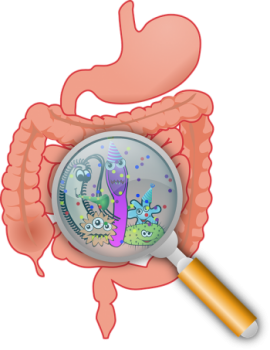Animals can be a very important part of our lives and pets can have many health benefits. While disease transmission between animals and people can occur, in most cases, basic infection control methods can be used to prevent disease spread. Some germs that people may be exposed to by contact with animals can cause intestinal illness. Intestinal illnesses often produce symptoms such as diarrhea, vomiting, abdominal cramps and fever and are typically spread by having oral contact with even a small amount of feces. That is why routine handwashing, at the very least before you eat, after you go to the bathroom and any time your hands are visibly dirty, is a critical part of helping to decrease the likelihood that you will become sick with an intestinal illness.
For more information about germs causing intestinal illness that you may be exposed to by direct contact with animals, please visit the information found on the Fact Sheet, Data and Resources pages below.

Notable Illnesses
Campylobacteriosis is an infection caused by bacteria called Campylobacter. It affects the intestinal tract (gut) and causes diarrhea. Anyone can get campylobacteriosis, although babies and children are more likely to have serious illness. Campylobacter is one of the most common causes of diarrheal illness in the United States. The bacteria are commonly found in the gut of animals and birds, which carry the bacteria without becoming ill. The bacteria can infect people who drink unpasteurized (raw) milk or contaminated water, or eat undercooked meats and organs, especially chicken. Just one drop of raw chicken juice can contain more than 500 bacteria, enough to cause illness. Other food items can be contaminated, for example, from improperly cleaned cutting boards. Handling infected animals, without carefully washing hands afterwards, may also lead to illness.
For more information visit the VDH fact sheet on Campylobacteriosis.
Cryptosporidiosis (also referred to as “Crypto”) is a diarrheal disease caused by a microscopic, single-celled parasite called Cryptosporidium parvum. Anyone can get cryptosporidiosis, but it may be more common in persons under two years of age, those who travel, work with animals, or are in close personal contact with infected individuals. People with weakened immune systems, such as people with HIV infection or receiving chemotherapy, are more susceptible to the disease. Cryptosporidium parvum has also been responsible for disease outbreaks in children and staff in daycare centers.
For more information visit the VDH fact sheet on Cryptosporidiosis.
Escherichia coli (also called E. coli) are bacteria that normally live in the intestines of humans and animals such as cows. Most strains of the E. coli bacteria do not cause illness. However, strains that produce toxins, referred to as Shiga toxin-producing E. coli (STEC), can cause serious illness. E. coli O157:H7 is the most common type of STEC, but other types exist. Anyone can get an STEC infection, but young children and older adults are more likely to have severe Illness.
For more information visit the VDH fact sheet on E. coli.
Giardiasis is an intestinal illness caused by a microscopic parasite called Giardia. It is a fairly common cause of diarrhea throughout the U.S. and the world. Anyone can get giardiasis, but it tends to occur more often in people in daycare centers, international travelers, and individuals who drink improperly treated surface water (such as hikers drinking from a stream or people swallowing water while swimming in a river or lake). The parasite has to enter the mouth to cause infection. This happens when people and animals infected with Giardia shed the parasite in their feces (stool) and the feces then contaminate surfaces, food, or water. People then can become infected by touching contaminated surfaces, getting the parasite on their hands and then putting their hands in their mouths, or by eating the contaminated food or swallowing the contaminated water.
For more information visit the VDH fact sheet on Giardiasis.
Salmonellosis is a disease caused by bacteria called Salmonella. It usually affects the bowels (gut) and causes an illness that lasts several days to a week. If the Salmonella bacteria spread to the blood, a more serious illness develops. Any person can get salmonellosis, but it is identified more often in infants and children. The elderly, infants, and those with impaired immune systems are more likely to experience severe illness. Salmonella can contaminate raw meats, including chicken, eggs, and unpasteurized milk and cheese products. These bacteria are also found in the feces (stool) of infected persons or pets (e.g., reptiles, chicks, dogs, cats).
For more information visit the VDH fact sheet on Salmonellosis.
Additional Information
- Healthy Pets, Healthy People (CDC)
- Backyard Poultry (CDC)
- Compendium of Measures to Prevent Disease Associated with Animals in Public Settings (National Association of State Public Health Veterinarians)
Opens pdf to download
Opens document to download
Opens in a new window
External link will open in new window. Click link to exit Virginia Department of Health Website.
